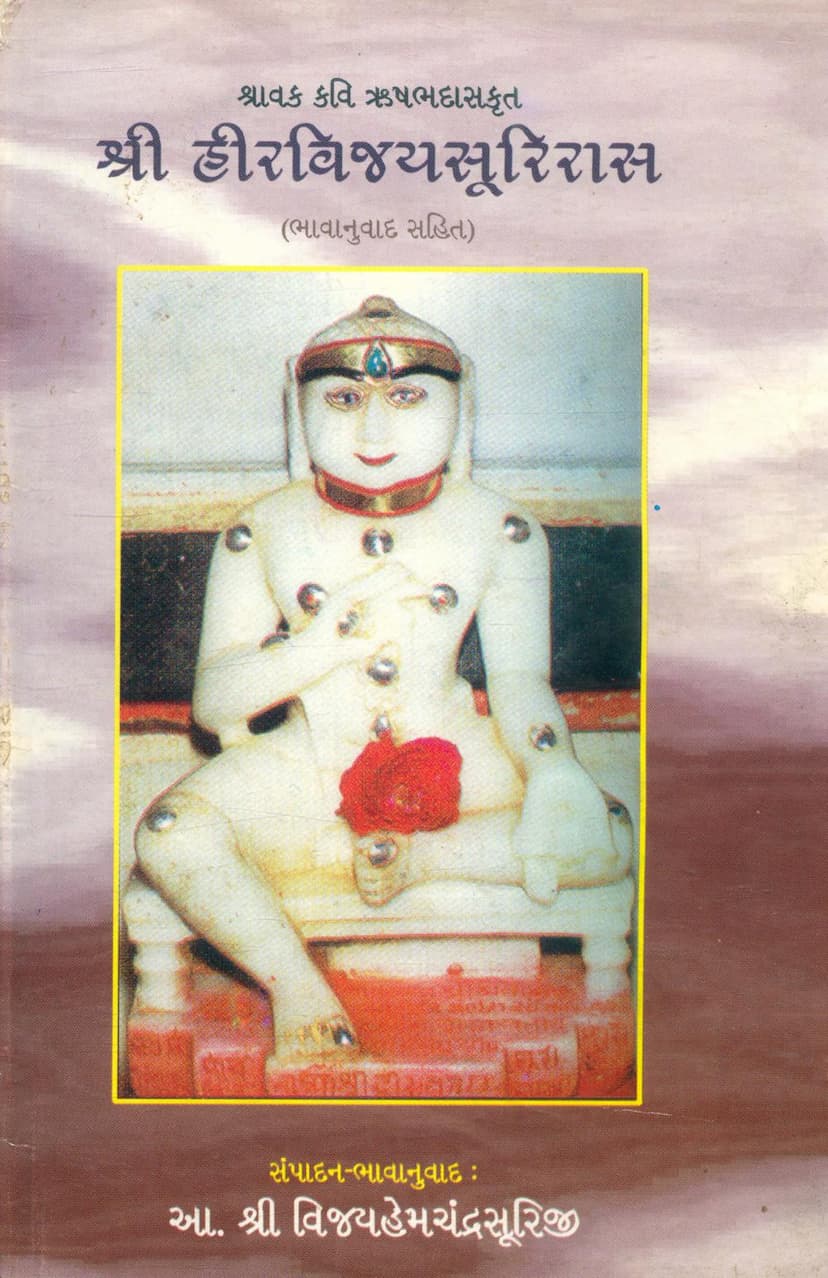Heervijaysuri Ras
Added to library: September 1, 2025

Summary
Certainly, here's a comprehensive summary of the Jain text "Shree Hirvijaysurirasa" by Shravak Kavi Rushabhdas, based on the provided text:
Title: Shree Hirvijaysurirasa (શ્રી હીરવિજયસૂરિરાસ) Author: Shravak Kavi Rushabhdas (શ્રાવક કવિ ઋષભદાસ) Editor & Translator: Acharya Shree Vijayhemchandrasuriji (આચાર્ય શ્રી વિજયહેમચંદ્રસૂરિજી) Publisher: Shree Shrutgyan Prasarak Sabha, Ahmedabad (શ્રી શ્રુતજ્ઞાન પ્રસારક સભા, અમદાવાદ) Publication Year: 1998 CE (Samvat 2054)
Overview:
Shree Hirvijaysurirasa is a significant Gujarati biographical epic (Rasa) composed by the Jain layman poet Rushabhdas. It details the life and achievements of Acharya Shree Hirvijaysurishwarji Maharaj, a prominent Jain Acharya who lived in the 16th-17th centuries (Vikram Samvat 16th-17th centuries). Acharya Hirvijaysurishwarji is particularly renowned for his intellectual prowess and his profound influence on Emperor Akbar, leading to significant reforms promoting non-violence in the Mughal Empire.
The Rasa is a comprehensive work, meticulously compiled and translated with commentary by Acharya Shree Vijayhemchandrasuriji. It covers various aspects of Acharya Hirvijaysurishwarji's life, from his birth and lineage to his spiritual practices, intellectual debates, social reforms, and interactions with the Mughal emperor Akbar. The work is structured into numerous verses (Dhal and Doha) and employs various poetic meters and ragas to enhance its narrative and devotional appeal.
Key Aspects and Themes:
-
Biographical Narrative: The Rasa meticulously chronicles the life of Acharya Hirvijaysurishwarji Maharaj. It begins with his birth in Palanpur, detailing his parents, lineage (including the founding of the Oshwal community by Raja Ransingh), early life, education, and eventual renunciation.
-
Spiritual Prowess and Teachings: The text highlights Acharya Hirvijaysurishwarji's deep spiritual understanding, his adherence to Jain principles, and his ability to propagate Jainism. His emphasis on non-violence (Ahimsa), ethical conduct, and philosophical debates is evident throughout.
-
Influence on Emperor Akbar: A central theme is the Acharya's impactful interaction with Emperor Akbar. The Rasa describes how Acharya Hirvijaysurishwarji debated with scholars from various religious traditions at Akbar's court. He successfully explained Jain philosophy, emphasizing compassion and non-violence. This led to significant royal decrees, including:
- The proclamation of "Amarin" (non-violence) across the empire for extended periods.
- The abolition of the Jaziya tax (levied on non-Muslims).
- The exemption of pilgrims from taxes for visiting holy sites like Shatrunjay and Girnar.
- Akbar's personal adoption of vegetarianism and his respect for Jainism, even bestowing upon Hirvijaysurishwarji the title "Jagatguru" (World Teacher).
-
Literary and Poetic Merit: The Rasa itself is a testament to Rushabhdas's poetic skill. The composition is noted for its fluid narrative, use of diverse meters (Dohra, Chaupai, Trivadi, etc.), and melodic ragas, making it engaging for readers and listeners. The editor, Acharya Vijayhemchandrasuriji, notes the captivating flow and the vivid descriptions that draw the reader into the story.
-
Historical and Cultural Details: The text provides valuable historical context about the period, including details about the Mughal court, societal customs, and the prevailing religious and philosophical landscape. It mentions figures like Abul Fazal, Birbal, and Todar Mal, and describes the grandeur of the Mughal administration and life.
-
Socio-Economic Impact: The Rasa touches upon the socio-economic aspects, like the prosperity of traders (Vanik), their contributions to Jain temples and communities, and the importance of virtuous conduct in accumulating wealth and maintaining social harmony.
-
Vast Scope of Works: The preface and the list of works by Rushabhdas highlight his prolific literary output, with numerous Rases on various Jain Tirthankaras, Kings, and Acharyas, showcasing his devotion and dedication to Jain literature. The bibliography within the text also lists numerous works related to Hirvijaysurishwarji, demonstrating the significant impact he had.
-
Devotional Aspect: The Rasa is deeply devotional, reflecting the author's profound reverence for Acharya Hirvijaysurishwarji. The narrative is infused with devotional sentiment, often describing the Acharya's spiritual radiance and the miraculous events attributed to him. The translation and commentary by Acharya Vijayhemchandrasuriji further enhance this aspect, making the text accessible and inspiring for a wider audience.
-
Compilation and Editing: The 1998 publication is a scholarly effort, edited and translated by Acharya Shree Vijayhemchandrasuriji. The work includes extensive research, comparative analysis of manuscripts (Pāṭhāntara), detailed indexes, and informative notes on the poet and the Acharya, significantly increasing the book's value and accessibility for researchers and devotees alike.
Key Figures Mentioned:
- Acharya Hirvijaysurishwarji: The central figure, a beacon of Jainism.
- Emperor Akbar: The Mughal emperor whose life was significantly influenced by Hirvijaysurishwarji.
- Rushabhdas Kavi: The poet who composed this epic.
- Acharya Vijayhemchandrasuriji: The editor and translator who brought this work to light.
- Other prominent figures: Mentioned in relation to the Acharya's lineage, disciples, or historical events, including various disciples, patrons, and contemporary scholars.
Significance:
Shree Hirvijaysurirasa serves as a vital historical document and a rich source of inspiration for the Jain community. It preserves the legacy of a remarkable Acharya and highlights the cultural exchange and philosophical influence possible between different traditions. The Rasa is a masterpiece of Gujarati devotional literature, admired for its poetic quality, historical depth, and spiritual message. The effort to publish this comprehensive edition ensures that this valuable work remains accessible for future generations.